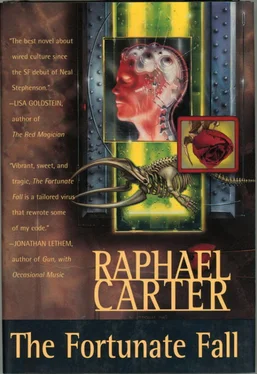Raphael Carter - The Fortunate Fall
Здесь есть возможность читать онлайн «Raphael Carter - The Fortunate Fall» весь текст электронной книги совершенно бесплатно (целиком полную версию без сокращений). В некоторых случаях можно слушать аудио, скачать через торрент в формате fb2 и присутствует краткое содержание. Город: New York, Год выпуска: 1996, ISBN: 1996, Издательство: Tor Books, Жанр: Киберпанк, на английском языке. Описание произведения, (предисловие) а так же отзывы посетителей доступны на портале библиотеки ЛибКат.
- Название:The Fortunate Fall
- Автор:
- Издательство:Tor Books
- Жанр:
- Год:1996
- Город:New York
- ISBN:0-312-86034-X
- Рейтинг книги:3 / 5. Голосов: 1
-
Избранное:Добавить в избранное
- Отзывы:
-
Ваша оценка:
- 60
- 1
- 2
- 3
- 4
- 5
The Fortunate Fall: краткое содержание, описание и аннотация
Предлагаем к чтению аннотацию, описание, краткое содержание или предисловие (зависит от того, что написал сам автор книги «The Fortunate Fall»). Если вы не нашли необходимую информацию о книге — напишите в комментариях, мы постараемся отыскать её.
“Gripping…. One of the most promising SF debuts in recent years”.
—“Publisher’s Weekly” starred review
The Fortunate Fall — читать онлайн бесплатно полную книгу (весь текст) целиком
Ниже представлен текст книги, разбитый по страницам. Система сохранения места последней прочитанной страницы, позволяет с удобством читать онлайн бесплатно книгу «The Fortunate Fall», без необходимости каждый раз заново искать на чём Вы остановились. Поставьте закладку, и сможете в любой момент перейти на страницу, на которой закончили чтение.
Интервал:
Закладка:
Raphael Carter
THE FORTUNATE FALL
for Pamela Dyer-Bennet
who turned out to be real
THANKS
to Rich Veraa, who was first to read it;
to Patrick Goodman, who delivered take-out
and helped vet the continuity;
to George Willard, who posed for a statue,
and provided lessons in parachuting and
costumery;
to Beth Friedman, who taught the nanobugs
how to drink;
to Patricia Wrede, who provided a critique so
perceptive I suspect she may be God;
and to Larissa Printzian, who told me the
story of Ivan Durachok, and may live to regret it.
1
VIRTUAL OR IMMEDIATE TOUCH
Love not the heavenly Spirits, and how their love
Express they? by looks only? or do they mix
Irradiance, virtual or immediate touch?
The whale, the traitor; the note she left me and the run-in with the Post police; and how I felt about her and what she turned out to be—all this you know. I suppose I can’t complain. I knew the risks when I became a camera. If you see something important enough, your thoughts become a coveted commodity: they steal your memories and sell them tied in twine. Now you may find my life for sale in certain stalls, on dusty street and twisting alleyway; it is available on moistdisk, opticube, and dryROM. There are places on the Net where you can make a copy free, although the colors may have faded to sepia and the passions to pastel. You have taken my memories and slotted them into your head. And you have played them through, reclining on a futon in some neon-streaked apartment, reliving my every sensation and thought from the hour underground with the whale.
If you paid extra for the moistdisk, you have more than just that hour. You can peer around each thought to see the memories implied in it, the way you’d turn a hologram to see what lies behind the rose. You can freeze-frame at the moment I first saw the whale, and follow the associations back—to the argument over Moby-Dick the night before; to the first time Voskresenye said the word, in the cafe on Nevsky Prospect; to the dolphins that made me clutch my mother’s hand with fear, at the amusement park when I was six years old. You have searched me and known me: and when at last you put the disk away, you thought of my mind as a sucked orange, dry of secrets.
But what you saw, heard, touched, remembered, does not quite exhaust my meanings. With the moistdisk in your head, however bristled you may be with sockets, what you see is only the moment of experience, frozen forever. It excludes any later reflections upon the event—as the hologram of a rose in bloom excludes the flower’s swollen ripening and black decay.
I will give you my thoughts since that time, but not on moist-disk. I will not let you explore the twining pathways of my thoughts as I explore them—not again. I will hide instead behind this wall of words, and I will conceal what I choose to conceal. I will tell you the story in order, as you’d tell a story to a stranger who knows nothing of it: for you are not my friend, and what you know is far less than you think you know. You will read my life in phosphors on a screen, or glowing letters scrolling up the inside of your eye. And when you reach the end, you will lie down again in your indifferent dark apartment, with the neon splashing watercolor blues across your face, and you will know a little less about me than you did before.
One
ASHES, ASHES
“Okay, what’s this scent?”
“Roses,” I said.
“And this one?”
“Citrus. Grapefruit.”
“All right. What about this?”
“Cow shit.”
“Close.”
“Okay, horse shit.”
“Bull’s-eye. Olfactory systems are go. Let’s do hearing.”
I was standing by the River Chu, in Kazakhstan, staring at a little hill from which three naked chimneys rose. I stood alone; but a thousand miles away, in Leningrad, a woman I had never met was testing my senses. When she had finished, she would slide herself into my mind, like a rat into water. As my thoughts went out live to the Net, she would screen them through hers, strengthening my foreground thoughts and sifting out impurities, so that—if she was any good—the signal that went out on News One would be pure and clear. And when she drew herself out of my mind again, five minutes later, she would know more about me than a friend of thirty years.
“I think it’s an E flat,” I said.
“Yes, but what instrument?”
“Brass.”
“Be specific.”
“Do I look like a conductor?”
“It’s a trombone. You can tell by the glissando. Now what’s this?”
I had never met this Keishi Mirabara. I had no idea what she looked like. But Keishi was a screener, so for her, our acquaintance of half an hour was already long. Hooking up mind to mind, the way they do, they can only scorn the glacial rituals the rest of us use to form friendships. By the end of the day, she might already hate me—not with some casual dislike, but with a deep, dissective hatred, such as is otherwise only attained after decades of marriage. It’s bad stuff, their hatred. Their love is worse: a surge of emotion that comes at you flood-fast, overwhelming your own feelings before you’re even certain what they are. And the poor camera, who can reach out to another mind only with mute eyes and vague bludgeoning words… well, it’s like being an amnesia victim, coming home a stranger to someone who’s loved you all your life.
“All right, stop me when this stripe is the same color as the sky.”
“Now—no, a little more—yes, there.”
“You’re coming through faded, then. I’m going to split your field of vision. What you’re seeing will be on your left, and what’s coming through here will be on your right. Tell me when the colors are the same. Ready?”
“Ready,” I said. I gave it only half attention. I had done this all before.
Keishi had come in to screen for me only that evening, when my last screener, Anton Tamarich, disappeared on the day of a broadcast. It didn’t surprise me—screeners go burnout all the time—but it left me stuck going live with a screener I’d never worked with before. It’s the beginning of any of a dozen camera nightmares. You’re working with a new screener who falls asleep at the switch just when you remember something you heard once about how to make brain viruses, and a Weaver possesses the man you’re interviewing and kills you on the spot. Or some especially compromising sexual fantasy flits through your head and out into the Net and is the scandal of the week. The untried screener is the camera’s equivalent of having your fly open.
It was scary enough that—though I’d never thought I’d say it— I missed Anton. I hadn’t liked him, but I’d liked working with him. He was an informer for the Post police, and he hated me. I knew where I stood.
“Say the words that come into your head.”
“Excrescence. Trapezoid. Spark. Blanket. Bolus. Rust.”
“Verbal, go. Okay, Maya, I’m ready for link-up. Say when.”
I walked halfway up the hill, arranged myself facing the river, and started to prepare myself for contact. After all these years of having strangers in my head, it’s still not easy. I scratched my nose, adjusted the camera moistware in the temporal socket at the side of my head, and made sure for the tenth time that I really did not have to go to the bathroom.
“Relax, will you?” Keishi whispered in my ear, from Leningrad. “‘So Your Camera Has To Pee’ is chapter two in the Basic Screening textbook, and heck, girl, I’m up to chapter four already.”
Читать дальшеИнтервал:
Закладка:
Похожие книги на «The Fortunate Fall»
Представляем Вашему вниманию похожие книги на «The Fortunate Fall» списком для выбора. Мы отобрали схожую по названию и смыслу литературу в надежде предоставить читателям больше вариантов отыскать новые, интересные, ещё непрочитанные произведения.
Обсуждение, отзывы о книге «The Fortunate Fall» и просто собственные мнения читателей. Оставьте ваши комментарии, напишите, что Вы думаете о произведении, его смысле или главных героях. Укажите что конкретно понравилось, а что нет, и почему Вы так считаете.












